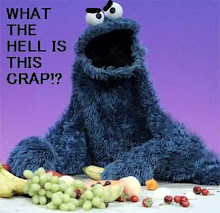
Expectations are not always easy to manage. Sometimes you get into a situation hoping for one thing, but getting another. It happens. But when years of television melodrama start to temper your expectations of the medical field, it's time to kick yourself in the ass.
Let me preface this schpiel with a little disclaimer; I'm not a complete idiot (usually). I understand that television in general has very little to do with any person's actual life, or how people behave in real-life situations. But let's just get to it...
So after a night of fun at Atlantic City last weekend I left the Jersey Shore with what appeared to be a bug bite on my right wrist. Long story short, within a day my hand swelled to a very painful extent and it was clear the emergency room was my only option. After 2 separate trips to the emergency room and an overnight stay in the hospital, I came to an important conclusion: hospitals are neither sexy, nor dramatic, nor inspired locales of curative and provocative wonder. Beyond this somewhat obvious sentiment for anyone who spends time in hospitals (I don't), I was shocked to find how disappointed I was in my caregivers, those supposed navigators of choppy medical waters, my lifeboats sent to delivery me to safer shores. My doctors were not wildly emotional, slutty, sentimental, or even power driven. There were no intermittent speeches about patients and cures and careers delivered at the optimal moment to relay important character traits of the sick and of the healers.
What I needed was a Dr. House to diagnose the freakish swelling of my hand by seeing into my soul with acute observations of nearly imperceptible physical/psychological cues. What I expected were people who were too busy to be bothered because they were occupied with trivialities, but in the end were certain and sure of themselves as doctors (more like a Grey's anatomy without the sex). Scrubs was out of the question from the start. What I got were bored and sometimes agitated people who were itching to reach the mot easily identifiable diagnosis to get me out of the way so they could keep complaining about procedural headaches. No one seemed to agree on anything, which you could say is typical TV drama, but the difference was no one cared that they didn't have the answer. It was easier to assume I was lying about how my hand started to swell (a fist fight was suggested more than once) because it got them to a conclusion faster. It was all guess work in the end. Thankfully, I'm alright and almost back to normal, but I was reminded that doctors do not get to rise above it all like the people on TV. They are the people we went to high school and college with who did stupid shit on the weekends. They get peeved about work just like us. Simply being knowledgeable in the medical field does not make someone inspired, right, or trustworthy, but then again, the title of Doctor is supposed to lead us to think these things.
I think TV, in a small way, helps us believe that Dr. House exists somewhere, and that an Izzie Stephens would fight for our needs. It's an overblown lie and we know it. It's probably more damaging to the doctors in the end; they have to deal with that kind of foolish disappointment. The silly thing is, I never really thought about my unchecked delusion until I had to spend time in a hospital. But my guess is that the writers of these shows are banking on that kind of shared desire; the hope to run into George Clooney in an emergency room that keeps people coming back for more.
Oh television, you are a wonder.


